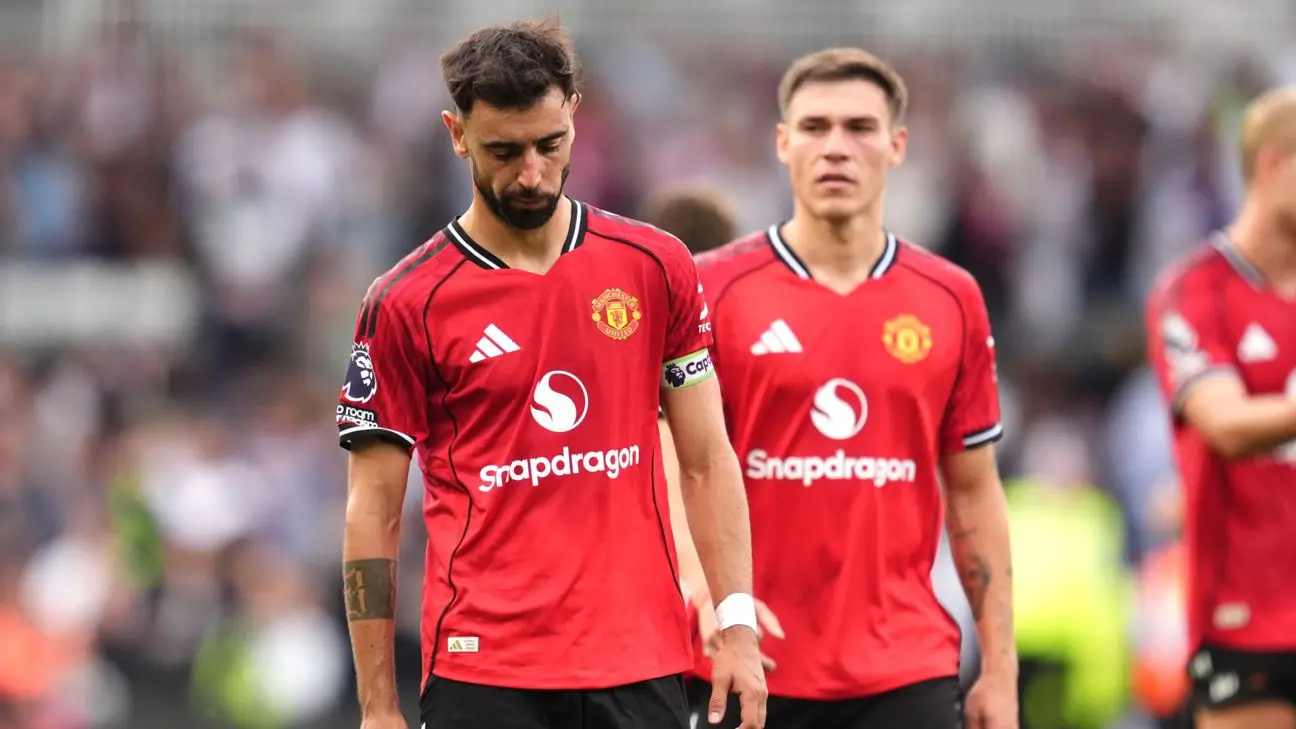In a season that promised renewal and fresh ambitions, Manchester United’s recent performances reveal that old issues continue to haunt the team. Despite significant investment and hopeful optimism among supporters, the Red Devils have only managed a solitary point from their opening two fixtures in the Premier League. Their draw against Fulham, marred by errors, questionable tactics, and unfulfilled offensive potential, underscores the urgent need for strategic adjustments and player quality reassessment. Manchester United Held to a Frustrating Draw by Fulham encapsulates the ongoing challenges faced by a club striving to reclaim former glory amid a backdrop of familiar struggles.
More Pep Guardiola Left Powerless Against Tottenham – Man City lose 2-0 EPL round 2 25-26

The goalkeeper remains a concern.
The goalkeeper position at Manchester United remains a ticking time bomb—an Achilles’ heel that could jeopardize the team’s ambitions this season. Budget constraints, tactical indecisiveness, and a lack of trust in current shot-stoppers have created a vulnerable backline that opponents are already exploiting. Despite new signings and coaching efforts, issues in goalkeeping continue to undermine team stability and confidence, severely affecting overall defensive organization.
Underperforming Goalkeepers and Tactical Missteps
The primary concern revolves around the inconsistent performances of the goalkeepers, with Altay Bayindir once again showing signs of unreliability. During the match against Fulham, Bayindir’s mental and positional lapses during set-pieces were glaring. His hesitation during defensive corners and free-kicks repeatedly put his defenders in difficult positions, forcing them to compensate for his lack of decisiveness.
This recurring problem is largely rooted in a combination of psychological unpreparedness and tactical uncertainty. Despite being given opportunities to prove his worth, Bayindir has yet to exhibit the concentration and command expected from a starting goalkeeper in a top Premier League club. His mistakes often lead to conceding goals or giving opponents’ forwards an advantage in critical moments, which diminishes team morale and heightens opponents’ confidence.
A Lack of Trust and the Search for Solutions
Adding to the goalkeeper dilemma is the apparent lack of faith from the coaching staff. Head coach Rúben Amorim seems to harbor reservations about both Bayindir and Andre Onana—who remains sidelined due to injury. In the meantime, the club is negotiating with Royal Antwerp’s Senne Lammens, but sources indicate that he is not viewed as a ready-made first-choice option. This creates a precarious situation where the team continues to oscillate without a clear and reliable number one, leaving defenders unsure about their last line of defense.
The decision-making process appears to be muddled, with Amorim caught between sticking with underperforming personnel and risking experimentations that could backfire. In the high-stakes environment of Premier League football, the goalkeeper’s role extends beyond shot-stopping; it involves communication, command of the area, and mental resilience—attributes that are currently lacking in the team’s custodians.
⚽ The midfield is unbalanced.
The midfield at Manchester United is another area where chaos threatens to undermine the club’s season. Despite entering matches with energetic setups and promising early spells, the team quickly loses control and collapses under pressure. The failure to establish dominance in midfield leaves the defense exposed and the attacking players starved for service, contributing to a pattern of inconsistent results and mounting frustration.
Disjointed Play and Lack of Creative Control
In their recent match against Fulham, United’s midfield was plagued with imbalance and hurried transitions. While initial efforts showed some promise, with Fernandes and Cunha combining for neat link-ups, the overall structure disintegrated as the game progressed. Fernandes, although a capable playmaker, often found himself isolated or burdened with defensive responsibilities, which limited his offensive impact.
The core issue lies in the disconnect among defensive midfielders and the attacking lines. Ugarte and Casemiro, expected to act as stabilizers, appeared unsure of their roles, frequently misjudging tackles or losing possession under pressure. Their inability to control tempo and distribute effectively meant that United lacked the consistent ball retention necessary for building sustained attacks.
The Search for a Balance and the Need for Reinforcement
The tactical setup, designed by Amorim, aims for fluidity and energetic pressing, but the players seem overwhelmed by the demands of modern Premier League midfield battles. The team’s fluctuations—ball retention during the opening minutes followed by rapid decline—highlight the need for a more disciplined and technically refined midfield presence.
To address these issues, Manchester United has been linked with potential signings, including a search for a true N’Golo Kante successor—an all-action, ball-winning midfielder capable of providing stability and creative support. Without such reinforcement, the team risks continued vulnerability, especially against high-intensity opponents who exploit gaps and overwhelm the midfield.
Key Data on Manchester United’s breakdown in midfield:
- Possession retention in first 15 mins: 65%
- Average passes completed per game: 580
- Pass accuracy: 78%
- Tackles won: 16
- Interceptions: 8
- Key players underperforming: Ugarte, Casemiro, Mount
This table indicates that while possession and passing are promising early on, the team struggles with defending transitions, a critical component of Premier League success.
In Summary
Manchester United’s current season opener reveals that, despite increased investment and a desire for tactical evolution, many old issues remain unresolved. The fragile goalkeeper situation, coupled with midfield imbalance, continues to undermine team stability and confidence. These problems are compounded by a lack of clear structure and leader-like figures able to inspire and organize play under pressure. As the club navigates through the early weeks of the campaign, addressing these foundational flaws—starting with goalkeeper security and midfield balance—will be critical to transforming potential into sustained performance. Only through targeted reinforcement, tactical clarity, and mental resilience can Manchester United begin to shake off the disappointment of an underwhelming start and move towards the success their fans crave.
Conclusion
Manchester United’s frustrating draw against Fulham highlights their persistent struggles with vital departments, especially goalkeeper reliability and midfield stability. Despite the season’s promising buildup and managerial efforts, fundamental gaps remain, causing inconsistency and mounting frustration among players and supporters alike. Addressing these issues with decisiveness and strategic transfers will be essential for the Red Devils to turn the tide and fulfill the club’s ambitions of competing at the highest level in the Premier League and beyond.

